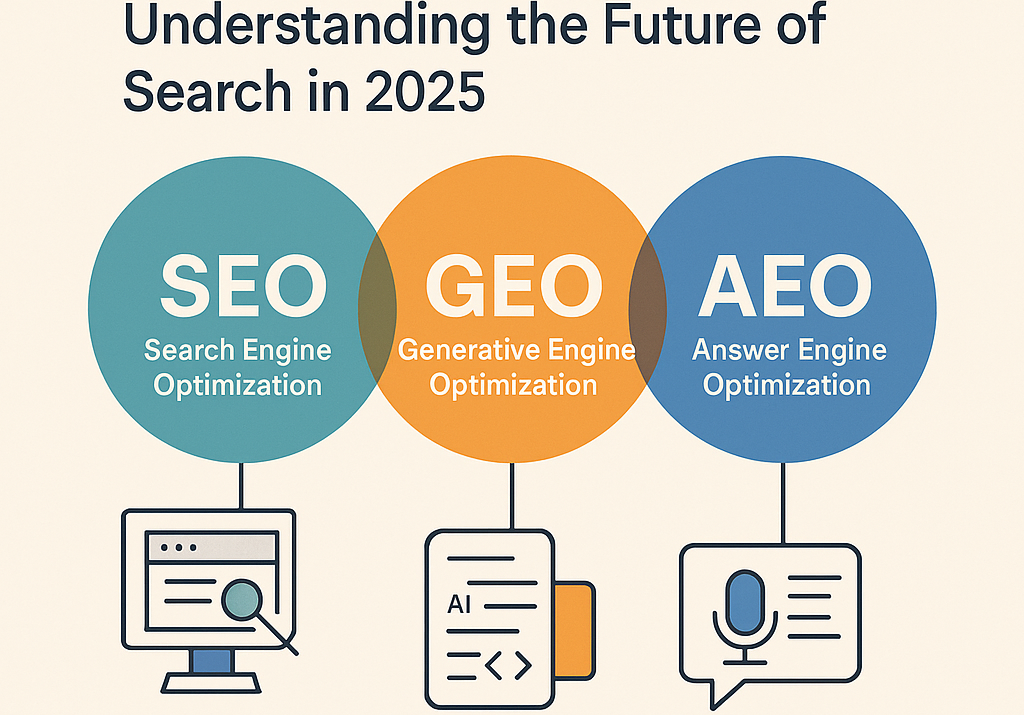When it comes to digital marketing, we’re used to hearing about SEO. But in 2025, two new players are becoming just as important: GEO (Generative Engine Optimisation) and AEO (Answer Engine Optimisation). If your business is still only focusing on traditional SEO services, it’s time to rethink your strategy.
Let’s unpack what these terms mean, how they’re shaping search behaviour, and what your team needs to prioritise to stay ahead.
What is SEO in 2025?
Search Engine Optimisation has been the backbone of digital marketing for decades. In 2025, SEO still means optimising your website and content so that search engines like Google can index and rank it effectively.
However, SEO today is more holistic. It’s not just about keywords and backlinks. Google’s algorithms have advanced to value user experience, helpful content and technical excellence. Businesses investing in SEO services in Melbourne are finding that ranking well requires:
- Fast-loading, mobile-friendly websites
- Quality backlinks from reputable sites
- Clear, structured content targeting user intent
- Integration of AI SEO strategies for scale
AI SEO services are now automating large parts of keyword research, content clustering and internal linking. But it’s the arrival of GEO and AEO that are changing the landscape further.
What is GEO (Generative Engine Optimisation)?
GEO stands for Generative Engine Optimisation. It’s a response to the rise of generative AI engines, like ChatGPT, Gemini, Claude, and Sora, which are now integrated into search platforms. For example, Google’s Search Generative Experience (SGE) shows AI summaries at the top of results, giving users instant answers without needing to click through.
So what does GEO involve?
Optimising for AI-generated summaries: Structuring content so AI can parse and summarise your expertise clearly.
Creating content that feeds LLMs: Ensuring your site’s schema, FAQs, and blog posts provide factual, digestible, and up-to-date information for AI engines to cite.
Focusing on topical authority: GEO rewards sites that are leaders in their niche. AI engines prefer citing one comprehensive source rather than multiple thin articles.
Agencies offering generative engine optimisation services are helping brands prepare for this new AI-powered search landscape, where featured snippets and citations from AI matter more than ever.
What is AEO (Answer Engine Optimisation)?
Answer Engine Optimisation is another emerging field. With voice search and AI assistants like Siri, Alexa, and Google Assistant, users are increasingly asking direct questions expecting direct answers.
AEO focuses on:
Conversational queries: Optimising for natural language questions, like “What is the difference between GEO and AEO in SEO?” rather than “SEO vs GEO vs AEO”.
Schema markup: Implementing structured data that helps answer engines understand and read your content out loud accurately.
Featured snippets and FAQs: These are prime targets for answer engines to pull from when reading responses to users.
As AI assistants become more embedded into cars, homes, and workplaces, AEO is moving from a nice-to-have to an essential SEO strategy.
How are SEO, GEO, and AEO Connected?
Think of them like three parts of the same ecosystem:
SEO is about optimising for traditional search engines – rankings, technical SEO, backlinks, and user-friendly sites.
GEO is about optimising for generative AI engines – creating content that can be cited or summarised in AI-powered search results.
AEO is about optimising for answer engines – providing precise, structured answers for voice queries and AI assistants.
In practice, your digital strategy should integrate all three. For example:
- Your blog posts should use traditional SEO practices to rank.
- Those posts should be structured with headings, FAQs, and schema markup so generative engines can summarise them effectively.
- The content should also include conversational questions and direct answers so AI assistants can read them out for voice searches.
Why Businesses Can’t Ignore GEO and AEO
The way people search is changing. In 2024 alone, studies showed that over 55% of Gen Z and Millennials used AI engines first before traditional search engines. This number is only set to increase in 2025.
If your business isn’t investing in AI SEO services that cover GEO and AEO, you’re missing out on visibility in AI summaries, chatbots, and voice assistants.
How AI SEO Services Tie It All Together
Traditional SEO agencies are evolving into AI SEO agencies. They’re using AI tools to:
- Analyse search behaviour for both traditional and AI engines
- Automate keyword clustering and topic modelling
- Generate content drafts faster, while ensuring human editing for accuracy and brand voice
- Implement GEO by creating schema-rich, structured content
- Integrate AEO strategies by focusing on conversational queries
Businesses are also engaging generative engine optimisation services to keep up with Google’s AI updates and ensure their content is AI-friendly.
Is GEO Replacing SEO?
No – it’s an addition, not a replacement. SEO builds your website’s foundational health and authority. GEO leverages that authority so AI engines cite you. AEO ensures voice assistants can read your answers clearly.
In 2025 and beyond, your content strategy should incorporate:
- SEO for rankings
- GEO for AI citations and summaries
- AEO for voice search and direct answers
Final Thoughts
In short, SEO vs GEO vs AEO isn’t about choosing one. It’s about integrating all three to future-proof your brand’s online presence.
As generative AI and voice search continue to reshape how users seek information, businesses that adapt early will dominate their niche. Whether you’re looking to boost traffic, improve AI visibility, or enhance voice search rankings, it starts with understanding these frameworks deeply.
If your team is ready to embrace the next wave of search, now is the time to invest in AI-powered SEO services, generative engine optimisation services, and advanced AEO strategies to keep your business at the top in 2025.

